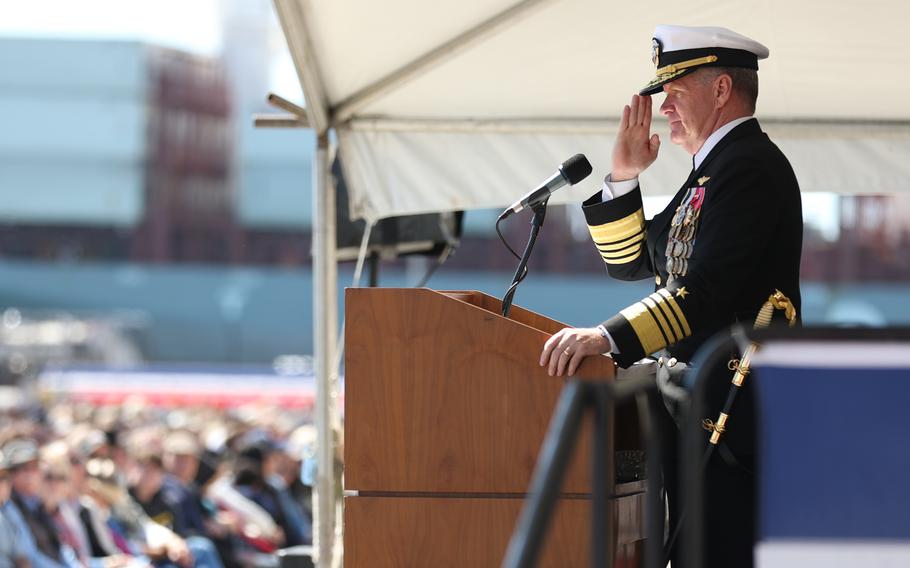
Adm. Samuel J. Paparo, commander of U.S. Pacific Fleet, speaks during the commissioning ceremony of the Independence-class littoral combat ship USS Santa Barbara, at Naval Base Ventura County, Port Hueneme, Calif., April 1, 2023. A judge could decide soon if Paparo will have to sit for a deposition in a drinking water contamination lawsuit. (Douglas "Evan" Parker/U.S. Navy)
(Tribune News Service) — A federal judge is expected to decide soon whether Adm. Samuel Paparo, commander of the Navy's Pacific Fleet, will have to sit for a deposition in a civil lawsuit brought by military and civilian families whose drinking water was contaminated with jet fuel from the Navy's Red Hill fuel facility in November 2021.
The plaintiffs, whose numbers are expected to swell to about 1,500, are asking the federal government to compensate them for past and future pain and suffering, emotional distress, medical expenses and property loss, among other damages they say are attributable to their drinking water being poisoned.
Attorneys for the Red Hill families already have deposed a number of high-level military and civilian officials who were overseeing the Navy's fuel facility in 2021. However, the federal government has balked at their request to depose Paparo, who is designated to become the next chief of naval operations, the Navy's senior military officer and a member of the Joint Chiefs of Staff.
Attorneys for both sides sought to persuade Magistrate Judge Kenneth J. Mansfield to rule in their favor as they presented oral arguments in a downtown Honolulu courtroom Wednesday.
Caroline Stanton, an attorney for the federal government, argued that deposing Paparo would not advance the plaintiffs' case and was an attempt to harass a high-ranking military official.
James Baehr, an attorney for the Red Hill families, countered that Paparo was in fact central to their case having led the military's response effort, including its communications plan and water remediation effort.
Paparo has "direct, personal knowledge" in the case, said Baehr, who countered that there was no intention to harass the admiral.
In written filings, both sides based their arguments off of the so-called Morgan and DeVos doctrines, which have shielded high-ranking executive branch officials from being deposed in similar cases unless there are exceptional circumstances. Courts have been reluctant to require such top officials to testify out of concern that it would bog down the functioning of government and raise separation of powers concerns.
Attorneys for the federal government argue that the plaintiffs have not shown that extraordinary circumstances exist or that Paparo's testimony is essential to their claims. They go on to argue that Paparo had only a limited role in Red Hill. As the Navy's senior officer in Hawaii, Paparo oversaw at least five separate commands with more direct oversight of Red Hill, they argue.
"The deposition of Admiral Paparo under these circumstances would be unnecessary and unduly burdensome," they wrote.
Attorneys for the Red Hill families counter that Paparo took a "hands-on leadership role" over Red Hill and cited daily emails Paparo sent to military officials briefing them on actions the Navy was taking once reports of odors in the drinking water started to pour in.
"Paparo was intimately aware of the intense focus on Red Hill from the highest levels of the Pentagon and served as the main conduit to the Chief of Naval Operations, Admiral Michael Gilday, regarding issues at the facility," they wrote. "He also served as a conduit to state and federal government officials, including the Governor of Hawaii to whom he described his role as involving briefings 'almost every hour of every day.'"
The Honolulu Star-Advertiser reached out to Paparo for comment.
"In order to safeguard the integrity of the process, we don't comment on ongoing litigation," a Pacific Fleet spokesperson said in response.
Mansfield indicated that he would issue a written decision in the case in the next few days.
(c)2023 The Honolulu Star-Advertiser
Visit staradvertiser.com
Distributed by Tribune Content Agency, LLC.